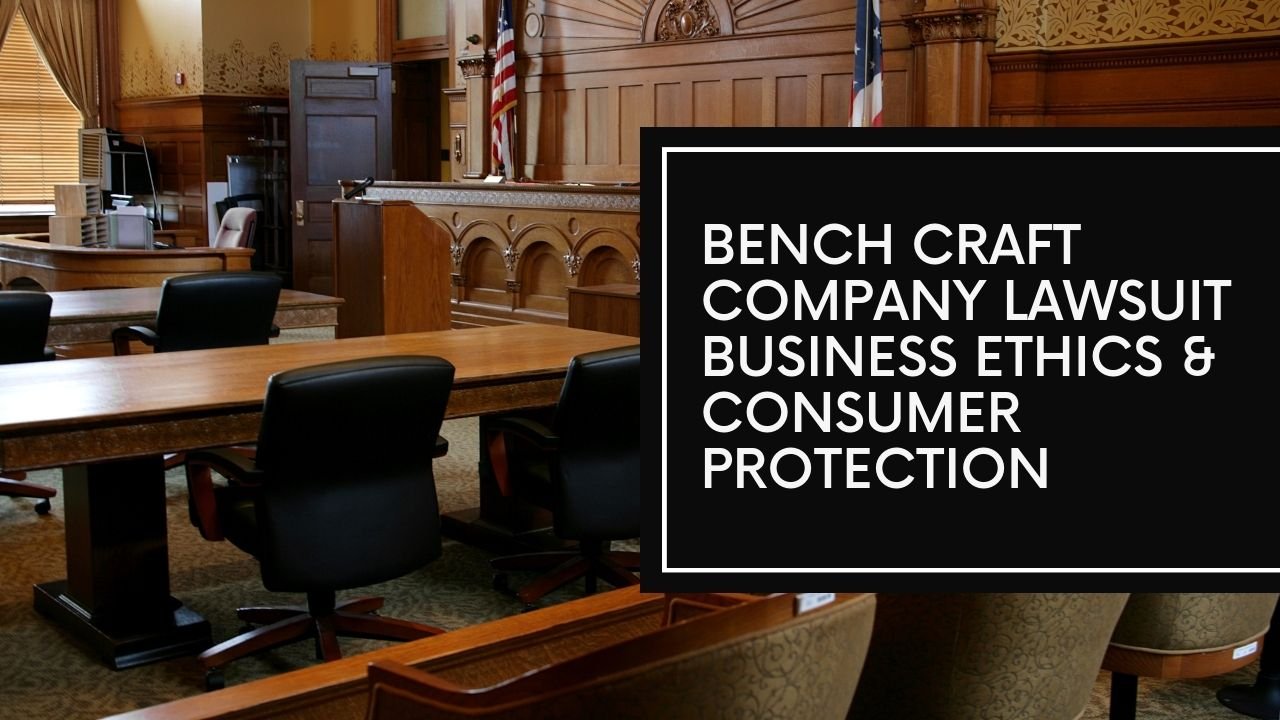Bench Craft Company, a marketing and advertising firm based in Oregon, USA, has been facing a class-action lawsuit since 2017 for allegedly violating the state’s Unlawful Trade Practices Act. The plaintiffs, who are mostly small business owners, claim that the company deceived them into signing contracts for golf course advertising services that were never delivered or were of poor quality. They also accuse the company of refusing to honor its cancellation and refund policies, and of causing them financial losses and emotional distress. This article will provide an overview of the Bench Craft Company lawsuit, its implications for the marketing and advertising industry, and the lessons that can be learned from it.
What is Bench Craft Company and what does it do?
The company’s profile and history
Bench Craft Company is a well-established marketing and advertising firm that specializes in golf course advertising. The company was founded in 1982 by Charles and Barbara Hall, who started the business from their garage. Also, The company has grown to become one of the largest and most successful golf course advertising firms in the country, with over 300 employees and offices in several states. The company claims to have over 40 years of experience in the industry, and to have served more than 100,000 clients.
The company’s products and services
The company works with local businesses to create and execute effective marketing campaigns that target an upscale clientele of golf enthusiasts. The company offers a range of innovative and eye-catching advertising materials, such as bench and tee box signs, scorecards, and yardage books. These advertising tools are designed to promote local businesses, boost their exposure to potential customers, and increase their sales.
Bench Craft Company has a network of partnerships with golf courses across the country, where it installs and maintains its advertising products. The company also offers other marketing solutions, such as digital advertising campaigns, print collateral, and website design.
What are the allegations and charges against Bench Craft Company?

The state’s lawsuit and claims
The Bench Craft Company lawsuit was initiated by the State of Oregon in 2017, after receiving numerous complaints from consumers who felt they were misled and cheated by the company. The state alleged that the company violated the Oregon Unlawful Trade Practices Act by engaging in the following practices:
- False and misleading advertising: The company allegedly misrepresented the quality, reach, and effectiveness of its advertising products and services. For example, the company claimed that its advertising materials would be seen by thousands of golfers every day, but failed to disclose that many of the golf courses where they were installed had low traffic or were closed for the season. The company also claimed that its advertising products were durable and weather-resistant, but many of them were found to be damaged, faded, or missing. Furthermore, the company claimed that it had exclusive rights to advertise at certain golf courses, but some of them had contracts with other advertising firms as well.
- Failure to honor cancellation and refund policies: The company allegedly made it difficult or impossible for consumers to cancel their contracts or request refunds. The company required consumers to sign long-term contracts that had automatic renewal clauses and hefty cancellation fees. The company also ignored or rejected consumers’ requests to cancel their contracts or get their money back, even when they had valid reasons, such as dissatisfaction with the service, non-delivery of the product, or financial hardship.
- Failure to deliver products and services as promised: The company allegedly failed to fulfill its obligations to its clients, such as installing and maintaining the advertising products, providing proof of performance, and updating the content. Many consumers reported that they never received the advertising materials they paid for, or that they received them late, incomplete, or incorrect. Some consumers also reported that the company did not respond to their inquiries, complaints, or requests for assistance.
The state sought to stop the company from engaging in these practices, and to obtain restitution, civil penalties, and injunctive relief for the affected consumers.
The class-action lawsuit and plaintiffs
In 2018, the lawsuit was granted class-action status, meaning that it could represent all consumers who had similar claims against the company. The class-action lawsuit was led by two named plaintiffs, who were business owners from Oregon and Washington. The plaintiffs claimed that they suffered financial losses and emotional distress as a result of the company’s actions. They also claimed that the company violated the Consumer Protection Acts of Oregon and Washington, as well as the Racketeer Influenced and Corrupt Organizations Act (RICO).
The class-action lawsuit aimed to recover damages for the plaintiffs and the class members, as well as to compel the company to change its business practices.
How has the lawsuit progressed and what are the possible outcomes?

The company’s defense and arguments
The company denied the allegations and asserted several defenses, such as lack of jurisdiction, failure to state a claim, statute of limitations, and arbitration agreements. Also, The company argued that the state did not have the authority to sue the company, that the plaintiffs did not have valid grounds for their claims, that the claims were filed too late, and that the plaintiffs had agreed to resolve any disputes through arbitration instead of litigation.
The company also challenged the class-action certification, arguing that the plaintiffs did not meet the criteria for representing a class of consumers. The company claimed that the plaintiffs’ experiences and circumstances were not typical or common of the class members, and that the plaintiffs’ interests were not aligned with the class members.
The settlement negotiations and mediation
In 2019, the parties entered into settlement negotiations, with the help of a mediator. The parties discussed the possibility of reaching a mutually agreeable resolution that would end the lawsuit and address the concerns of the consumers. The parties exchanged proposals and counter-proposals, and explored various options and scenarios.
However, as of 2020, no settlement agreement has been announced or finalized. The parties have not disclosed the reasons for the impasse or the status of the negotiations.
The trial preparation and motions
In 2020, the parties continued to prepare for a possible trial, in case the settlement negotiations failed. The parties exchanged discovery materials, such as documents, depositions, and expert reports. The parties also filed motions to exclude or admit certain evidence, and to dismiss or certify certain claims.
The trial date has not been set yet, but it is expected to take place in 2021. The trial could last for several weeks or months, depending on the complexity and number of issues involved. Also, The trial could also be delayed or postponed due to various factors, such as the COVID-19 pandemic, the availability of the court and the parties, and the possibility of further settlement talks.
The lawsuit could have different outcomes, depending on whether the parties reach a settlement or go to trial. If the parties settle, they could agree on terms such as payment of restitution, civil penalties, or injunctive relief, as well as changes in the company’s business practices. If the parties go to trial, the court could rule in favor of either side, or a jury could decide the verdict and the amount of damages. The losing party could also appeal the decision to a higher court.
Also Read: Smoothstack Lawsuit: What You Need to Know Before Joining This IT Staffing Company
What are the implications and lessons of the Bench Craft Company lawsuit?
The impact on the company and its clients
The Bench Craft Company lawsuit has not just affected the company and its clients, but also the marketing and advertising industry in general. The lawsuit has had a negative impact on the company’s reputation, credibility, and profitability. The company has faced public scrutiny and criticism, as well as legal costs and liabilities. The company has also lost some of its clients and partners, and has struggled to attract new ones.
The clients of the company, on the other hand, have faced financial losses and emotional distress, as well as damage to their own reputation and credibility. The clients have also had to deal with the hassle and uncertainty of the legal process, and the possibility of not getting their money back or their problems resolved.
The issues and questions raised by the lawsuit
The lawsuit has raised some important issues and questions, such as:
- Business ethics and consumer protection: The lawsuit has highlighted the need for businesses to adhere to ethical standards and legal regulations when marketing and advertising their products and services. Businesses should not make false or misleading claims, or engage in unfair or deceptive practices, that could harm or mislead consumers. Businesses should also honor their contractual obligations, and respect the rights and interests of their clients. Consumers, on the other hand, should be aware of their rights and responsibilities, and exercise due diligence and caution when entering into contracts or transactions with businesses. Consumers should also report any problems or complaints to the relevant authorities, and seek legal recourse if necessary.
- Marketing and advertising trends and challenges: The lawsuit has also reflected the changing trends and challenges in the marketing and advertising industry, especially in the digital age. Businesses are constantly looking for new and innovative ways to reach and attract customers, and to stand out from the competition. However, businesses also face increasing scrutiny and regulation, as well as rising consumer expectations and demands. Businesses need to balance creativity and innovation with compliance and accountability, and to ensure that their marketing and advertising strategies are effective, ethical, and sustainable.
- Marketing and advertising education and training: The lawsuit has also underscored the importance of education and training for marketing and advertising professionals, as well as for business owners and managers. Marketing and advertising professionals need to have the knowledge and skills to design and implement marketing and advertising campaigns that are aligned with the best practices and standards of the industry. They also need to have the awareness and sensitivity to avoid or resolve any ethical or legal issues that may arise in their work. Business owners and managers, meanwhile, need to have the understanding and competence to evaluate and oversee the marketing and advertising activities of their businesses. They also need to have the communication and negotiation skills to deal with their clients and partners, and to handle any disputes or conflicts that may occur.
Conclusion
The Bench Craft Company lawsuit is a lesson in business ethics and consumer protection, as well as a case study of the marketing and advertising industry. The lawsuit serves as a reminder and a warning for businesses and consumers alike, to be vigilant and responsible in their marketing and advertising dealings. The lawsuit also provides an opportunity and a challenge for businesses and consumers to learn from their mistakes, and to improve their marketing and advertising practices and outcomes.
FAQs
How many consumers are part of the class-action lawsuit, and how much money are they seeking in damages?
The class-action lawsuit has more than 1,000 consumers who signed contracts with Bench Craft Company between 2014 and 2017. They are seeking damages for the amount they paid to the company, plus interest, punitive damages, and attorney fees. The exact amount of damages is unknown, but it could be in the millions of dollars.
What are some examples of the advertising materials that Bench Craft Company provided or failed to provide to its clients, and how did they affect their businesses?
Some of the advertising materials that the company offered or promised were bench signs, tee box signs, scorecards, and yardage books. These were supposed to help the local businesses reach and attract golfers. However, the company allegedly did not deliver or provide quality products and services, and the consumers did not get any benefits or returns from their investment. Instead, they suffered financial losses and emotional distress, as well as damage to their reputation and credibility.
How does Bench Craft Company compare to other marketing and advertising firms in the industry, and what are the best practices and standards for golf course advertising?
Bench Craft Company is a leading marketing and advertising firm for golf course advertising. The company offers various products and services, such as bench signs, tee box signs, scorecards, and yardage books. However, the company has been sued for allegedly lying to its clients, failing to deliver or provide quality products and services, and refusing to cancel or refund contracts. Other marketing and advertising firms in the industry have to follow the best practices and standards for golf course advertising, such as being honest, reliable, and respectful.

